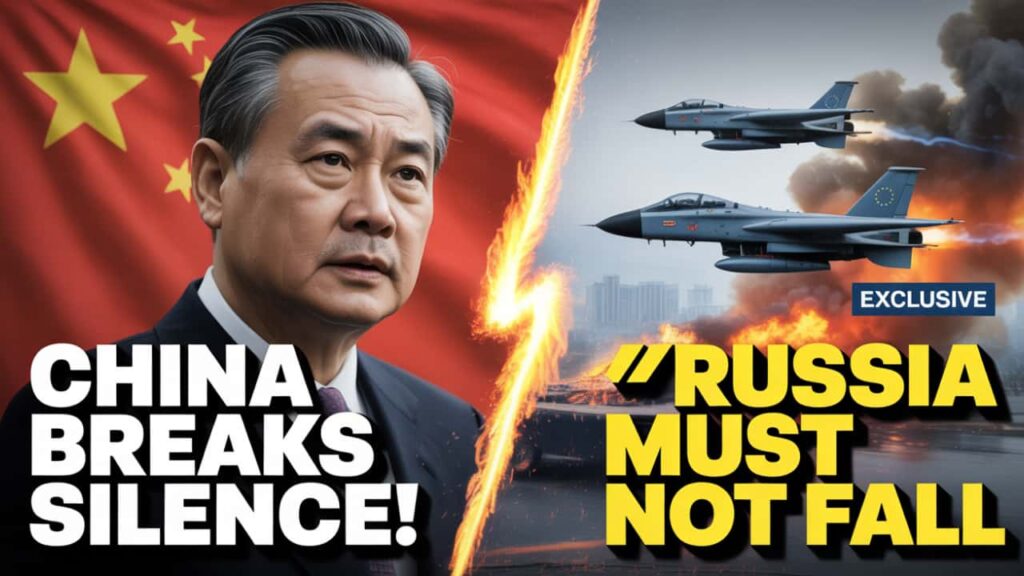The geopolitical landscape continues to evolve as fresh revelations confirm what many analysts have long suspected—China supports Russia in Ukraine war not only through diplomatic rhetoric but also through critical technology, trade, and political positioning.
While Beijing maintains its public stance of neutrality, mounting evidence suggests that China is playing a behind-the-scenes role in keeping Russia’s war machine operational and globally legitimized.
This article explores the nature, scope, and implications of how China supports Russia in Ukraine war, examining what this alliance means for the West, the ongoing sanctions regime, and the global balance of power.
Behind Closed Doors: China’s Strategic Statement
According to recent reports, Chinese Foreign Minister Wang Yi explicitly told the European Union’s High Representative for Foreign Affairs, Kaja Kallas, that China cannot allow Russia to lose the war in Ukraine. This candid exchange took place during a four-hour closed-door debate in Brussels—one of the most direct indications that China supports Russia in Ukraine war on a strategic level.
While China has repeatedly stated that it is “not a party to the conflict,” Wang’s comments point to a broader geopolitical calculation: a Russian defeat could embolden the United States and NATO, putting China at greater strategic risk in the Indo-Pacific.
Economic & Technological Lifeline: Support Without Weapons
Despite not supplying arms, China supports Russia in Ukraine war through extensive dual-use technology transfers, loosened export controls, and financial channels that help Moscow withstand Western sanctions.
EU sanctions envoy David O’Sullivan recently revealed that up to 80% of components used in Russian weapons production now originate from China, especially in the drone manufacturing sector. This includes microchips, semiconductors, and high-tech optical systems.
Such support, while not openly military, plays a vital role in enabling Russia’s battlefield capabilities and blunts the intended impact of Western sanctions.
Diplomatic Shielding: Blocking Western Consensus
On the global diplomatic stage, China supports Russia in Ukraine war by blocking or watering down resolutions critical of Moscow. At the United Nations, China has abstained from condemning Russian actions and instead echoed Kremlin narratives about NATO expansion and Western provocation.
China’s position in forums like BRICS and the Shanghai Cooperation Organization (SCO) also helps Russia project a sense of normalcy and alignment with other rising powers—further eroding the effectiveness of Western-led isolation efforts.
Rare Earths, Trade, and Global Leverage

In response to EU pressure, Chinese officials have warned that attempts to sanction Chinese firms or banks could trigger retaliation in the form of rare earth export restrictions—a critical concern for Western tech and defense industries.
During her meeting with Wang Yi, Kaja Kallas raised alarms over these “distortive practices”, arguing they pose a threat to European supply chain reliability. Yet, by threatening or applying such economic pressure, China supports Russia in Ukraine war while reinforcing its own leverage over the West.
A Calculated Partnership: Mutual Benefit, Shared Enemy
The growing China-Russia axis isn’t just about Ukraine. It’s about the long game: reshaping the global order away from U.S.-led unipolarity. For China, Russia acts as a strategic buffer in Europe, allowing Beijing to focus on its Indo-Pacific ambitions, including Taiwan and the South China Sea.
In return, Russia gains a crucial partner that helps stabilize its economy and defend its legitimacy on the world stage. Together, they are quietly building an alternative world order—one where authoritarian regimes coordinate, resist sanctions, and challenge Western norms.
Implications for the West and Global Security
The growing evidence that China supports Russia in Ukraine war has forced the West to reassess its diplomatic strategies. The European Union is currently considering blacklisting two Chinese banks for facilitating sanctions evasion, part of its 18th sanctions package against Russia.
Meanwhile, U.S. policymakers warn that China’s behind-the-scenes support could extend the war indefinitely and even embolden future military moves by Beijing itself.
This geopolitical entanglement risks turning the Ukraine conflict into a proxy struggle between global superpowers—with lasting consequences far beyond Eastern Europe.
(FAQ): Why China supports Russia in Ukraine war?
Is China officially involved in the Ukraine war?
No. China maintains it is not a party to the war, but it has provided technological and economic support that helps sustain Russia’s military capabilities.
How exactly does China support Russia in Ukraine war?
Through the export of dual-use technologies, financial channels, rare earth leverage, and diplomatic shielding in global forums.
Has China supplied weapons to Russia?
There is no public evidence that China has provided direct military aid. However, the EU claims that China-origin components power many of Russia’s weapons systems.
What are the strategic motivations behind China’s support?
To prevent a U.S.-dominated world order, maintain a multipolar balance of power, and protect its own geopolitical interests.
What is the West doing in response?
The EU and U.S. are tightening sanctions and warning Chinese firms and banks of consequences if they continue aiding Russia’s war effort.
Conclusion
While it may not be visible on the battlefield, the evidence is clear: China supports Russia in Ukraine war through calculated economic, technological, and diplomatic means. This growing alignment represents a significant shift in the global power structure—one that challenges the West’s ability to enforce sanctions, maintain unity, and contain authoritarian ambition.
As this silent partnership strengthens, the world must reckon with a future in which conflicts like Ukraine are no longer regional—but global, strategic, and deeply intertwined.
🔎 For more investigative reports, geopolitical insights, and exclusive analysis, visit www.documentarytimes.com —where context meets clarity.
Play the hottest casino games in India! Download 1WIN APK now and start winning instantly.